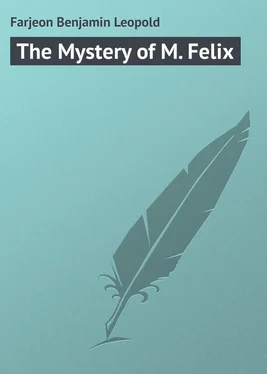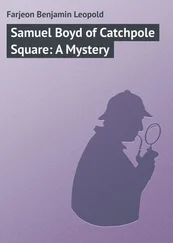Benjamin Farjeon - The Mystery of M. Felix
Здесь есть возможность читать онлайн «Benjamin Farjeon - The Mystery of M. Felix» — ознакомительный отрывок электронной книги совершенно бесплатно, а после прочтения отрывка купить полную версию. В некоторых случаях можно слушать аудио, скачать через торрент в формате fb2 и присутствует краткое содержание. Жанр: foreign_prose, foreign_language, на английском языке. Описание произведения, (предисловие) а так же отзывы посетителей доступны на портале библиотеки ЛибКат.
- Название:The Mystery of M. Felix
- Автор:
- Жанр:
- Год:неизвестен
- ISBN:нет данных
- Рейтинг книги:4 / 5. Голосов: 1
-
Избранное:Добавить в избранное
- Отзывы:
-
Ваша оценка:
- 80
- 1
- 2
- 3
- 4
- 5
The Mystery of M. Felix: краткое содержание, описание и аннотация
Предлагаем к чтению аннотацию, описание, краткое содержание или предисловие (зависит от того, что написал сам автор книги «The Mystery of M. Felix»). Если вы не нашли необходимую информацию о книге — напишите в комментариях, мы постараемся отыскать её.
The Mystery of M. Felix — читать онлайн ознакомительный отрывок
Ниже представлен текст книги, разбитый по страницам. Система сохранения места последней прочитанной страницы, позволяет с удобством читать онлайн бесплатно книгу «The Mystery of M. Felix», без необходимости каждый раз заново искать на чём Вы остановились. Поставьте закладку, и сможете в любой момент перейти на страницу, на которой закончили чтение.
Интервал:
Закладка:
"'Only when he was saying, "This is to be," or, "That is to be." At other times he was as smooth as marble, and always passed a pleasant word.'
"'He had visitors occasionally, I suppose?'
"'Oh, yes, sir, but I scarcely ever sor them. Nearly always he let 'em in and out 'isself.'
"'In a manner of speaking, then, he led a secret life?'
"'Some might call it so. Gentlemen living in chambers do all sorts of things.'
"'So I believe,' said our reporter, dryly.
"'And it ain't for the likes of us to question 'em. We've got our living to make, and if it pays us to be mum, mum we must be.'
"'I understand that. From what I can gather, Mrs. Middlemore, M. Felix had no family?'
"'Not that I know of, sir.'
"'As to his visitors, now, were they mostly ladies or gentlemen?'
"'Mostly ladies, sir.'
"'Have any of them been here to see his body?'
"'Not one, sir.'
"'That is strange. He might almost as well have died on a desert island.'
"'Yes, sir. That's the reason why we've been all at sea what to do. There was nobody to give directions.'
"'It is certainly a perplexing situation, unprecedented in my experience. Should you happen to meet any of the persons who were in the habit of visiting him, would you be able to identify them?'
"'I don't think I should, sir.'
"'Supposing that he came by his death in a violent way-I don't say it is so, because the medical evidence does not favor that conclusion-but supposing that this evidence was misleading, and was proved to be so, there is nobody to take up the matter authoritatively, to take measures, I mean, to bring the guilty party to justice?'
"'Nobody, sir.'
"'Only the police?'
"'Yes, sir, only the police?'
"'And all they have succeeded in doing is to make things uncomfortable for you?'
"'Yes, sir,' sighed Mrs. Middlemore, 'that's all they've done. I said to Mr. Nightingale, "A nice friend you've been," I said. I couldn't 'elp saying it after all I've gone through.'
"'Is it Constable Nightingale you are speaking of?'
"'Yes, it is.'
"'Is he an old friend of yours?'
"'He was on the beat 'ere before Mr. Wigg.'
"'Ah; and that is how you got to know him?'
"'Yes.'
"'He knew M. Felix, probably?'
"'Mr. Felix made a point of being always friendly with the policemen on the beat.'
"'Sensible man. Tipped them, I daresay?'
"'They'd best answer that theirselves. He never give me nothing to give 'em.'
"'What did Constable Nightingale say when you made that remark to him?'
"'Nothing,' replied Mrs. Middlemore, with sudden reserve.
"'Surely he must have made some remark, to the effect that he was your friend, or words bearing the same meaning?'
"'He didn't say nothing.'
"Our reporter gave up the point; it was his cue to keep Mrs. Middlemore in a good humor.
"'I'll have one more look in the bedroom,' he said.
"At first his scrutiny was not rewarded by any discovery, but, passing his hand over the pillows on the bed, he felt something hard beneath them, and upon lifting them up he saw a six-chambered revolver, loaded in every barrel.
"'Lord save us!' cried Mrs. Middlemore, starting back.
"'Did you not know it was here?'
"'No, sir, this is the first time I ever saw it. I never knew he kep' one.'
"'Do the police know?'
"'They didn't mention it, sir.'
"'Well, we will leave it where it is. Don't touch it, Mrs. Middlemore; it's loaded.'
"Before he replaced it, however, he made the following note in his pocket-book: 'A Colt's double-action revolver, nickel plated, six shots, No. 819.' And, unseen by Mrs. Middlemore, he scratched on the metal with his penknife the initial F. Then he looked at his watch, and said-
"'It is nearly ten o'clock. My advice now is that you go and give the alarm to the police that the body of M. Felix has vanished.'
"'You'll go along with me, sir?'
"'No, for your sake I had better not be seen. Give me two minutes to get away, and then go for the police at once. I will come and see you again, and help you in every way I can.'
"Shaking her hand, and leaving half a sovereign in it, our reporter, accompanied by Mrs. Middlemore, went to the street door, and left her standing there."
CHAPTER XI.
THE "EVENING MOON" IS INUNDATED WITH CORRESPONDENCE CONCERNING THE DISAPPEARANCE OF THE BODY OF M. FELIX
"As was to be expected, the news of the disappearance of the body of M. Felix caused the greatest excitement. In small villages trifling incidents are sufficient to create an interest; in great cities events of magnitude are required to stir the pulses of the people; and in both village and city, to arouse the public from their normal condition of apathy, it is necessary that the incidents must have local color. Soho was sufficiently central, and, it may be added, sufficiently mixed and mysterious in the character of its population, to fulfil this imperative condition of popularity. Every resident in London knows the locality, and is to some extent familiar with it; it is contiguous to the most fashionable thoroughfares; it is within a stone's throw of theatres of magnificent proportions; it gives shelter to foreign princes deposed for a time from their high estate, and to foreign votaries of vice of both sexes who, being outlaws, cannot pursue their infamous courses in their native lands. If we were asked which part of London contains the most varied material for the weaving of modern romance we should unhesitatingly point to the region of Soho. A careless stroller through those thoroughfares little dreams of the strange and wondrous life which beats beneath the apparently placid, the undeniably squalid, aspect of this pregnant locality. The elderly woman, poorly clad and closely veiled, who glides past him is a prominent member of a Royal family who for a long period held the reins of power in one of the greatest European nations; she lives now in a garret upon dry bread and German sausage, and makes her own bed and fire. Yesterday she wore a crown of diamonds, to-day she wears a crown of sorrow. The attenuated man, whose worn-out garments hang loosely upon his spare body, and who is now studying carte du jour in the window of a low French restaurant, nervously fumbling at the same moment the few loose coins in his pocket, was, in years gone by, one of the greatest financiers in the world; yesterday he dealt in millions, had scores of carriages and hundreds of servants, paid fabulous prices for rare gems and pictures, and provided funds for mighty wars; to-day he is debating whether he can afford an eighteen-penny dinner. The man with an overhanging forehead, who strides onward with teeth closely set, and the fingers of whose hands are continually clinching and unclinching, is the head of a secret society whose members number hundreds of thousands, and whose deed of blood shall next week convulse the world with horror. We could dwell long upon this fascinating theme, but our business is with M. Felix, and we must not wander from him.
"As we have already stated, we were the first to give the public the intelligence of his strange disappearance, and so intense was the interest the news excited that our printing-machines could not supply one-fourth of the demand for the various editions of our journal. The letters we received upon the subject would form a curious chapter in a new 'Curiosities of Literature.'
"'Dear sir' (wrote one correspondent), 'you speak of the disappearance of the body of M. Felix as an unparalleled incident. Allow me to correct you, and from my own experience to furnish your readers with an identical case. It is now ten years ago since I formed the acquaintance of a gentleman of great attainments and peculiar habits, and whose nationality was always a matter of curiosity with me. Once or twice I delicately approached the subject, but he skilfully evaded it, and I did not feel warranted in pressing it. He was a wonderful chess-player, an accomplished linguist, and his knowledge of the niceties of every new discovery in science was simply marvellous. He had only one failing-he drank and smoked too much. In those days I also was a free liver. We were both single men, I certainly, he presumably; there are topics upon which it is good breeding to preserve a friendly delicacy. We met frequently, and dined together at least twice a week, at my expense. He was a good judge of wine and liquor, and very choice in his food. Being much superior to me in this respect, I invariably left it to him to decide where to dine and to arrange the courses. Perhaps occasionally we took half a bottle of wine too much, but that is neither here nor there. It was no one's business but our own. He took a peculiar interest in all new inventions, and was in the habit of throwing out hints of an extraordinary invention of his own which one day was to revolutionize the world. He told me very little of his discovery of which anyone could make use, but he was so jealous of his secret that he bound me down to solemn secrecy on the point; and I trust I am too much of a gentleman to violate the confidence he reposed in me. I may, however, without scruple, reveal that his invention related to combustion. One evening, when we had arranged to dine as usual together at the Royal, in Regent Street, he confided to me that he was in temporary want of funds, and I lent him all the money I had about me, some fifteen or sixteen pounds. Then we dined, and he paid for the dinner. Over the meal he talked more frequently than he was in the habit of doing of his invention. "It is near completion," he said, "and before I go to bed I intend to make some experiments which I am in hopes will put the finishing touch to it." Then he looked at me searchingly and thoughtfully, and said I might accompany him home if I liked, and assist in the experiments. Burning with curiosity, and delighted at this mark of his confidence, I gladly consented, and we issued forth and proceeded to his rooms, which, singularly enough, were in Glasshouse Street, at no very great distance from the house in which M. Felix lived. On our way he purchased two bottles of brandy, remarking that even when the soul was in its highest state of exaltation the body required nourishment and sustaining. I acquiesced. He lived on the second floor, in two rooms, one his bedroom, the other the room in which he conducted his experiments. There was no evidences of the nature of these experiments visible, and he explained this to me by stating that, distrusting his housekeeper, he kept them in his cupboard. The first thing he did was to light a large fire; then he brought forth a brass frying-pan, upon which he emptied a packet of powder. "You must not be frightened at what I am about to do," he said. "There is no very great danger in it, but it needs courage." Being already primed with the wine we had at dinner, and with three glasses of the brandy he had purchased, I told him I was prepared for anything. Then he informed me that his experiments must be made without light from candle or lamp; so that, with the exception of the fire, we were in darkness. Then he put the brass frying-pan on the fire, and a blue vapor floated through the room. I felt a little nervous, but I would not confess it, and I helped myself to another glass of brandy, and puffed away at a very large and very strong cigar with which he presented me. He bade me sit in a particular chair by a little table (upon which he considerately placed the two bottles of brandy, one by this time half empty), and he drew around me upon the floor, which was destitute of carpet, a circle with a piece of billiard chalk, and said that as long as I did not move outside that charmed circle I should be safe. "Help yourself to some more brandy," he said, "and do not be frightened." I obeyed him as to the brandy, but I must confess I was in great trepidation, more especially as the dim objects in the room appeared to be going round and round. He threw some more powder into the brass frying-pan, and this time the vapor was green. He then asked me if I had anything in the shape of metal upon my person, and I answered yes, of course; upon which he stated that I might be in danger unless I divested myself of them, as he was about to do. At a little distance from me, between me and the fire, he drew upon the floor a smaller circle with his piece of billiard chalk, and within it placed a trinket or two of his own. I handed him my gold watch and chain, my diamond ring, my pearl and ruby pin, and a valuable charm of gold which I kept in my pocket for luck. These he placed with his own trinkets within the smaller circle, and said that now no harm could befall me. The objects in the room went round more and more as he muttered some cabalistic words, and to prevent myself from being overcome by terror I took some more brandy. Then he threw about half a dozen little packets of powder into the fire, one after another, and all sorts of colors appeared, and filled the room with a peculiar smell, which so affected me that I helped myself to brandy. I must not forget to mention that he had locked the door and put the key in his pocket. "If what I am doing alarms you," he said, "you may close your eyes. You have great courage, and to prove my friendship for you I shall present you with half the profits of my invention." I tried to thank him, but to my surprise my words were not very clearly spoken. Presently my eyes began to close, and I fell asleep. When I awoke the room was in darkness. I called to my friend, but he did not answer me. Fearful lest he himself should have fallen a victim to his hazardous experiments, I rose unsteadily to my feet and felt around till my hands reached the door, which, of course, was locked. Luckily I had in my pocket a box of matches, and striking one I lit the candle. My friend was gone; I was alone in the room; but upon the floor was a small heap of ashes. Not only was my poor friend gone, but all his trinkets as well as my own were also gone. But there upon the floor was the fatal heap of ashes. I could arrive at but one conclusion, namely, that the combustion which was the kernel of his great invention had reduced him to ashes and destroyed him. There could be no other explanation of the extraordinary occurrence, because the door was still locked. Fearful lest I might be accused of his death, I forced the door open and fled, and from that day to this the affair has remained wrapped in mystery. This is the first time I have mentioned it, and I do so now in the interests of justice, lest some unfortunate person should be accused, as I might have been in the case of my friend, of spiriting M. Felix away. May not his disappearance be set down to combustion? Are there any charred marks upon the floor of the room where his body lay? Were any ashes left? Was he given to dangerous experiments? My own experiences may lead you, sir, to the proper solution of the mystery which hangs around his fate. I shall follow the further developments of the case of M. Felix with interest, and am, Yours, etc.'
Читать дальшеИнтервал:
Закладка:
Похожие книги на «The Mystery of M. Felix»
Представляем Вашему вниманию похожие книги на «The Mystery of M. Felix» списком для выбора. Мы отобрали схожую по названию и смыслу литературу в надежде предоставить читателям больше вариантов отыскать новые, интересные, ещё непрочитанные произведения.
Обсуждение, отзывы о книге «The Mystery of M. Felix» и просто собственные мнения читателей. Оставьте ваши комментарии, напишите, что Вы думаете о произведении, его смысле или главных героях. Укажите что конкретно понравилось, а что нет, и почему Вы так считаете.












